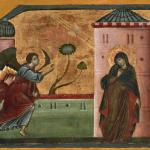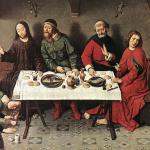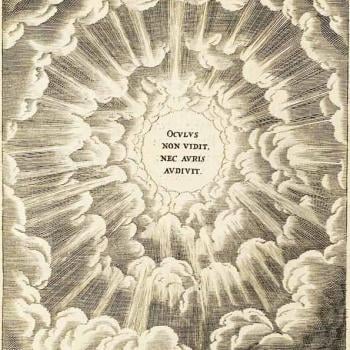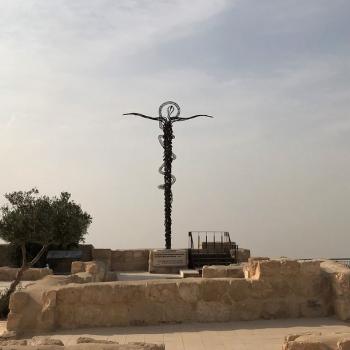Now this I think signifies that the most Divine and Highest of the things seen and contemplated are a sort of suggestive expression, ‘of the things subject to Him Who is above all, through which His wholly inconceivable Presence is shown, reaching to the highest spiritual summits of His most holy places; and then he (Moses) is freed from them who are both seen and seeing, and enters into the gloom of the Agnosia; a gloom veritably mystic, within which he closes all perceptions of knowledge and enters into the altogether impalpable and unseen, being wholly of Him Who is beyond all, and of none, neither himself nor other; and by inactivity of all knowledge, united in his better part to. the altogether Unknown, and by knowing nothing, knowing above mind.
Dionysius’s use of Moses to represent the mystical ascent towards God comes from his reading of the book of Exodus, in which he read how Moses went up Mt. Sinai to meet God in a darkness beyond sight:
Now when all the people perceived the thunderings and the lightnings and the sound of the trumpet and the mountain smoking, the people were afraid and trembled; and they stood afar off, and said to Moses, “You speak to us, and we will hear; but let not God speak to us, lest we die.” And Moses said to the people, “Do not fear; for God has come to prove you, and that the fear of him may be before your eyes, that you may not sin.” And the people stood afar off, while Moses drew near to the thick darkness where God was (Ex. 20:18-21 RSV).
Moses reached the summit of the mountain by himself. When he arrived there, he received the great commandments of God in the midst of loud thunderings, trumpets and bright lights. The people were taken aback by what they heard and saw, fearing the presence of God. And yet what they heard and saw was not God himself, but signs and symbols, secondary representations which manifested his presence to them. Through such signs and symbols, God can be contemplated; they help establish a basis for kataphatic theology. But they must never be confused as the fullness of truth; they do not reveal to us all that God is in himself. This is why Dionysius explained that with all exterior signs of the most Divine and Highest of the things seen and contemplated are themselves not to be understood as God but merely a sort of suggestive expression, ‘of the things subject to Him Who is above all, through which His wholly inconceivable Presence is shown, reaching to the highest spiritual summits of His most holy places. God, who is beyond all sight and sound, who is beyond what the mind can comprehend, nonetheless reaches down and gives to us signs and symbols filled with his presence so that we have a foundation for our faith. They are given to us so that we can know him and his greatness. Seeing how fearful they can be for us, we can then realize why, when we are not yet ready for union with him, we should hold back like the people of Israel. So long as we are not yet pure, not yet set apart, not yet ready to transcend conventions and a desire to relate to the truth insofar as we can know and comprehend it, we must hold back. But God does not leave us without a guide. Those, like Moses, who are able to journey further, should be received by us; we should let them teach us the way so that we can prepare ourselves for the journey and follow after them, until at last, we are ready to go up to the summit of spiritual experience where we are able to unite ourselves with God.
Moses, having become purified and transcending all others with him, cut himself from all other company as he even cut himself from all expectations as to what he thought God should do. Likewise, he cut out all thoughts, including and especially those about God, so that he could journey towards God with a learned ignorance; he was learned because he has first explored and engaged kataphatic theology, learning about God, speaking about what he has learned with others, displaying great insight from his own experience as well as from what he had learned from others before him. He was wise through much study and contemplation, but he had to let it all go; thus, we away from everyone else, into solitude, even abandoning himself and all he thought he knew from his learning, so that he could enter the darkness of God. There, he (Moses) is freed from them who are both seen and seeing, and enters into the gloom of the Agnosia (that is, unknowing). Moses’ freedom with God is established when he embraces God in that darkness and gloom. Cutting off all his discursive thoughts about God, abandoning every attempt to embrace God through his senses or his intellect, he is brought up beyond himself to that peak of spirituality where God is to be found. He has completely silenced himself, a gloom veritably mystic, and in that silence, he opened himself up to God so that by inactivity of all knowledge, he was free to be united in his better part to. the altogether Unknown.
We learn from this that as long as we try to hold on to and assume our notions of God and remain attached to them in the activity of our mind, we are unable to open up to God himself as he is and let him come to us and elevate us in himself. We come to know God in a transcendent fashion, for by accepting our ignorance and cutting off all our thoughts about God, by knowing nothing, we come to a knowing above mind, just as Moses himself, in going to the thick darkness was able to come to and experience the glory of God, as St. Gregory of Nyssa, whom Dionysius likely read, explained:
When, therefore, Moses grew in knowledge, he declared that he had seen God in the darkness, that is, that he had then come to know that what is divine is beyond all knowledge and comprehension, for the text says, Moses approached the dark cloud where God was. What God? He who made darkness his place, as David says, who also was initiated into the mysteries in the same inner sanctuary.[1]
Knowledge is useful, but with us, because our finite nature, it has a limit and there will be an end to what we can attain. On the other hand, our union with God, which is bound in and by love, has no such limits, as St. Paul indicated:
Love never ends; as for prophecies, they will pass away; as for tongues, they will cease; as for knowledge, it will pass away. For our knowledge is imperfect and our prophecy is imperfect; but when the perfect comes, the imperfect will pass away (1Cor. 13:8 – 10 RSV).
Moses reached the summit of his spiritual potential when he was open to God. This allowed him to become a great exemplar for those who, like him, seek to engage God. As a great mystic, he overturned all his thoughts and words, abandoning his reliance upon his senses, as he entered into the darkness of God as if he were a blind man. Yet he was far from blind; he has overcome the ordinary way of encountering God in the world and saw through it and its limitations. He had found that all kataphatic theology can do is point to and approximate the truth of God through conventions; it is useful to learn, a tool which we lean on to start our journey towards God, but when we have grown in strength and wisdom through the grace of God, we can and should put it behind us and go where it cannot go, to God himself and encounter him in his perfection. Love, for it is what God is, is everlasting as God is everlasting; but our imperfections, including, but not limited to the imperfections of our speech and knowledge, shall pass away if we truly want to hold on to and receive God because God is perfect and our knowledge is imperfect. God is love and opens us to a way of unknowing knowing beyond ourselves in our union with him. To get that perfection, we must put away the things of our spiritual youth and willing and boldly journey upon the proper spiritual path, the one which leads us to the darkness of God where we will find ourselves restored in God.
Through Moses, we are given a sampling of the different stages which we can expect on our journey toward God. He, like most of us, started with various forms of kataphatic theology, living and acting according to what he understood, until he found out he had to negate it and all he thought he knew so that he could enter the darkness of God without any thoughts or ideas getting in the way from his encounter with God. What Dionysius did not state, but is assumed through what he wrote, is that once he entered the darkness of God, he found himself embraced with the glory of God, with the light of truth, that it transformed him so that he in himself a reflection of that light of glory could be seen by others. It shone so bright, he had to veil himself. Thus, St. Maximus the Confessor explained:
Having entered this state (to the extent that it is granted to human nature), he received, as a prize worthy of that blessed ascent, knowledge encompassing the genesis of time and nature. Taking God Himself as the type and exemplar of virtues, he modeled himself on Him, like a picture expertly capturing the likeness of the archetype, and as such he came down from the mountain. Shining with glory, he showed his face to those below as a sign of grace he received, freely giving and presenting himself to them as one who had become an image of the divine archetype. And he made this clear by explaining to the people what he had seen and heard, and by handing down the mysteries of God in written form for those who were to come after him, as a kind of God-given inheritance.[2]
Having come to union with God, having come to God in the darkness, Moses was able to take what he learned and engage and direct the people of Israel in signs and symbols, hoping to give them the means to come follow after him and engage God for themselves. He talked about and gave witness to the truth which he experienced through words, veiling the fullness of truth in them, as the glory of God which resided in Moses was veiled from the people through a covering over his face. The truth of our words come not from the words themselves, but from the truth which transcends words which can only be pointed to through conventional approximations of the truth. God-talk is important. It helps people come to know about God, to awaken their need to encounter God for themselves, but in the end, it is only God-talk by those like Moses who have encountered God and know him from the dark light of truth beyond words who can properly partition out with words what we need to know in order to be directed towards the mystical summit, which we should all seek if we desire the truth. Moses, therefore, is not only the exemplar in showing it is possible to come to that peak, but also, what we should do once we arrive there. He did not stay apart from the people, but he returned to them, coming with the truth which they needed in order to overcome falsehood and find themselves set upon the path which takes them to God.
[Image=Mt. Sinai by El Greco [Public domain], via Wikimedia Commons]
[1] St. Gregory of Nyssa, Life of Moses. Trans. Everett Ferguson and Abraham J. Malherbe (New York: Paulist Press, 1978), 95.
[2] St. Maximos the Confessor, On Difficulties in the Church Fathers. The Ambigua. Volume 1. Trans. Nicholas Constas (Cambridge: Harvard University Press, 2014), 173.
Stay in touch! Like A Little Bit of Nothing on Facebook













